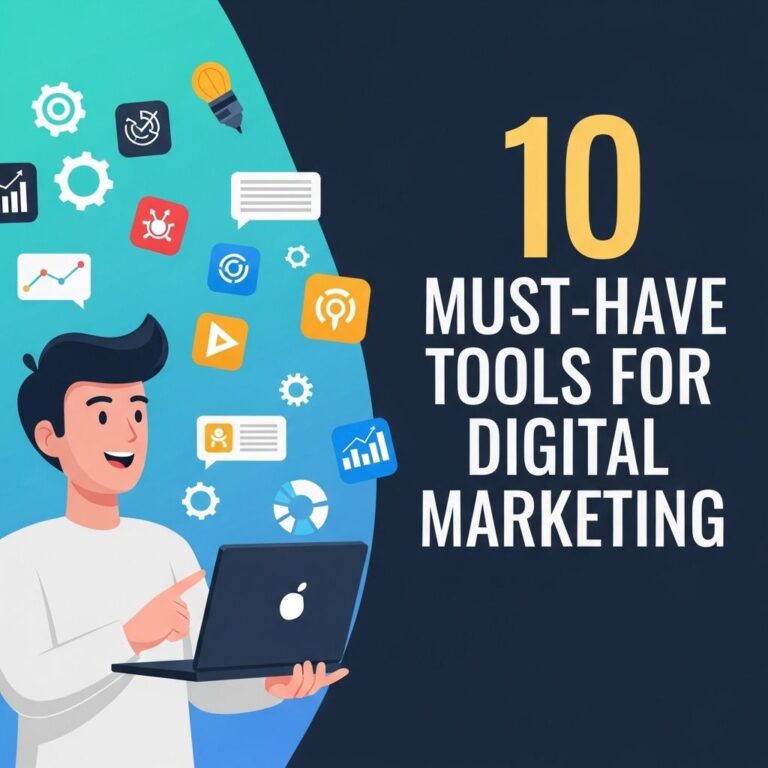Table of Contents
Understanding Digital Marketing
Digital marketing is an essential aspect of modern business, encompassing all marketing efforts that use an electronic device or the internet. Businesses leverage digital channels such as search engines, social media, email, and other websites to connect with current and prospective customers. As technology continues to advance, the ways we engage with consumers constantly evolve. This evolution poses both challenges and opportunities for marketers who aim to reach broader audiences and achieve their business objectives.
In its simplest form, digital marketing is about laying the groundwork to engage with your target audience effectively. Mastering this art involves understanding the nuances of online platforms and effectively engaging with your audience through various strategies. For businesses today, a robust online presence isn’t just an option—it’s a necessity to stay relevant and competitive.
Key Components of Digital Marketing
To build a successful digital marketing strategy, you need to be familiar with its key components. Each plays a vital role in helping you connect with your audience, build brand awareness, and drive sales.
- Search Engine Optimization (SEO): SEO is the process of optimizing online content to rank higher in search engine results, increasing visibility and organic traffic. It’s about understanding what your audience is searching for and ensuring they can discover your content when they search. Incorporating targeted keywords, optimizing meta descriptions, and improving site architecture are a few tactics to enhance SEO.
- Social Media Marketing: Engaging with audiences through platforms like Facebook, Instagram, Twitter, and LinkedIn to build a brand and foster community. These platforms offer specific tools to help marketers create targeted campaigns and gather insights about audience engagement and content performance.
- Content Marketing: Creating and sharing valuable content to attract and engage a target audience, ultimately driving profitable customer action. Content marketing involves blogging, video creation, podcasts, and other forms of content that provide utility to the user while establishing credibility and trust.
Emerging Trends in Key Components
Emerging trends in these areas can give your marketing efforts a futuristic edge. For example, AI-driven SEO can assist in understanding user intent more clearly, while live video on social platforms can enhance authentic engagement with audiences. Additionally, interactive content, like quizzes and polls, makes content marketing more engaging and helps in collecting valuable user feedback.
Effective Strategies for Success
Implementing a successful digital marketing strategy requires a combination of creativity, technical know-how, and a deep understanding of your audience. Here are some strategies that are pivotal for digital marketing success:
- Audience Research: Identify your target audience’s demographics, preferences, and behaviors to tailor your marketing efforts effectively. This involves creating detailed buyer personas and understanding what drives your audience’s decision-making processes.
- Data-Driven Decisions: Use analytics tools to track performance and make informed decisions based on data insights to optimize marketing strategies. This can involve A/B testing of ads, evaluating customer journeys, and understanding conversion paths.
- Personalization: Customize the customer journey with tailored content, recommendations, and offers to enhance engagement and conversion rates. Personalization can be accomplished through email marketing, where segmentation and targeted content are tailored to the specific needs of different audience segments.
- Consistent Branding: Ensure your branding is consistent across all digital platforms. This includes everything from your tone of voice and message to your visual identity, ensuring that your audience receives a seamless experience regardless of how or where they interact with your brand.
Testing and Iteration
Success in digital marketing often comes down to testing and iterating on your strategies. Regularly analyzing the effectiveness of your campaigns, identifying what works and what doesn’t, and being willing to pivot when necessary are crucial to staying ahead in the increasingly competitive digital landscape.
Challenges in Digital Marketing
While digital marketing presents vast opportunities, it also poses several challenges that marketers must navigate:
The digital landscape is constantly evolving, requiring marketers to stay updated with the latest trends and technologies to remain competitive. Algorithm changes, data privacy issues, and the saturation of digital spaces demand that marketers be agile and forward-thinking in their approaches. Some of the most common challenges include:
- Ad-Blocking Technology: The rising use of ad-blockers by consumers poses a challenge for digital marketers who rely heavily on paid advertisements.
- Increasing Competition: With more businesses recognizing the importance of digital marketing, the level of competition continues to grow, making it harder to stand out.
- Rapid Technological Changes: Technological advancements, such as AI and machine learning, require constant learning and adaptation for marketers to harness their full potential.
Overcoming Challenges
To overcome these challenges, marketers need to focus on differentiation, provide genuine value in their offerings, and build strong, authentic relationships with their audiences. Being authentic in messaging, continuously learning, and being adaptive are important qualities for any successful digital marketer.
Conclusion
Mastering digital marketing is an ongoing process of learning, adapting, and innovating. By understanding its key components and implementing effective strategies, businesses can harness the power of digital marketing to achieve their goals and reach new heights. As the landscape evolves, those who stay informed and flexible in their strategies will be best positioned to leverage digital marketing’s full potential. Whether you’re a small business owner or the head of a marketing department, embracing these practices can help you build a robust digital presence and succeed in today’s competitive marketplace.
FAQ
What is digital marketing?
Digital marketing refers to any marketing efforts that use an electronic device or the internet to reach consumers. It encapsulates a wide variety of tactics and channels that help businesses connect with their audience where they spend much of their time—online.
How do I start with SEO?
Begin with keyword research to understand what your potential customers are searching for. Optimize on-page elements like title tags, meta descriptions, and ensure your content provides value. Additionally, focus on improving site speed and mobile responsiveness, as these are also crucial ranking factors in search engines.
Why is social media marketing important?
Social media marketing is crucial because it allows direct engagement with your audience, broadens reach, and boosts brand visibility. It allows brands to tell their stories, build genuine relationships with consumers, and respond in real-time to customer inquiries and feedback.
What tools can help with data-driven marketing?
Analytics platforms like Google Analytics, SEMrush, and HubSpot provide insights into audience behavior and marketing effectiveness. These tools can track metrics such as traffic sources, user engagement, conversion rates, and more, allowing marketers to make data-driven decisions to enhance campaign results.









